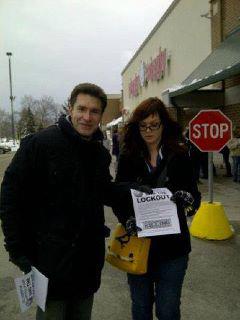Yesterday Democratic Lt. Governor candidate Henry Sanders, Jr. released an editorial making the case for the state to implement Best Value Contracting as a means of ensuring Wisconsin’s taxpayers get the most possible bang for their bucks, both in the short term and especially in the long term.
Here’s the text of Sanders’ editorial:
Wisconsin taxpayers deserve best value in state contracts
by Henry Sanders, Jr.
People often say state government should run like a business, or that the people in charge of the budget should approach it as they would their own family finances. As someone who runs a small business, I see that logic. In truth, it’s quite a bit more complicated than that, but government spending has some things in common with business and household budgets — namely, you get what you pay for.
Say I’m shopping for a car. I could buy the cheapest car on the lot. But chances are I’m going to spend some extra money for added safety, better handling, better gas mileage, and more leg room. Besides all that, if I buy the cheaper car, I know I’m going to have to spend more on maintenance in the long run. We all know from being burned once or twice that cheapest is not always the best value.
The same goes for state purchasing and contracting. Wisconsin law currently requires that public contracts at the state and local level be awarded to the “lowest responsible bidder.” In effect, many projects — from technical assistance to major construction — are awarded based on cost alone. While these policies certainly reduce the immediate costs, they have also often forced a race-to-the-bottom, resulting in the use of lower-quality input products and sub-standard work. Lowest responsible bidder policies have also been known to ignore previous performance and product quality issues. In many cases, the necessary repairs, replacements, and additional work hours cost the taxpayer significantly more in the long run.
If you purchased a low-price car with high repair costs, you probably wouldn’t buy the same model again. But in government in Wisconsin, “value” can’t be considered when purchasing goods and contracting services. The law says it has to be all about price — even if that’s not the best value for us as taxpayers.
I want to change that, and Best Value Contracting is a key component of Progressive Recovery, my 18-point plan to put Wisconsin back to work. Wisconsin should change the law to implement these practices as soon as possible.
Best Value Contracting (BVC) awards projects to contractors that meet the best combination of price, quality, technical expertise, and past performance. It allows government to look beyond the usual, more myopic up-front price comparison, so that we’re actually looking at the real, long-term costs to the taxpayers. BVC can also be used to prioritize the employment of local contractors and workers, making it effectively a “Buy Wisconsin” initiative as well.
Best Value Contracting has a proven track record of success. Nearly 70% of federal construction spending has used BVC since 2001, and more than ten states have authorized the use of BVC for state and local projects.
Project bids would still use standard Request for Proposal (RFP) criteria – with all the usual public announcement and competition requirements. Up-front price remains a key criterion, but a weighting system would be applied to other important factors, including past performance, safety history, training, expertise, and impact on the local workforce.
By authorizing and implementing Best Value Contracting policies, the State of Wisconsin and our local governments will take a more holistic approach to the bidding process, get more value from contractors, place a greater weight on getting local workers back on the job, and save millions of taxpayer dollars in the process. I urge the legislature to write BVC into state statutes as soon as possible in the next session. My years of experience as a nonprofit executive and a small business owner have reinforced the value of “getting what you pay for.” It’s about time our leaders in Madison understood that value, too.



Henry brings up valuable concepts. We should always consider more matters than price when buying products, which I do personally and professionally. It has worked well for my business that is en route to have a marvelous year. Price only buyers usually get caught in traps that lead to frustration and failure. Go Henry.
This seems like plain old common sense to me. And yet, the politicians under the big white dome somehow haven’t figured it out yet. It’s good for labor, it’s good for local businesses, and it saves the state money – so it’s about time someone actually took the lead on this.
Sure this all sounds good – with lots of nice generalizations (you get what you pay for, etc) but nearly all of the other factors cited besides price can and damn well should already be factor in by the RFP/RFQ process. The specifications defining exactly what the deliverable needs to be including quality, safety requirements etc. If you do a proper job of spec’ing out the job, then among the bidders who exactly meet them, the lowest price bid is the winner. He’s oversimplifying the law here. Wisconsin Statutes 16.75(1)(a) specifically says,
There are plenty of other exceptions allowing much greater flexibility than “you must go with the low bidder even if they’re awful” that he’s suggesting.
The real problem is not the process itself or that the law is too rigid. Honest politicians and bureaucrats have all the flexibility to do the right thign. The problem is it’s that it’s done by corrupt politicians and not enough transparency or public scrutiny.
Sorry – flubbed the link to the source:
Lawserver.com
That was my thought as well. The RFP and bidding documents should ensure that you have an apples to apples comparison.